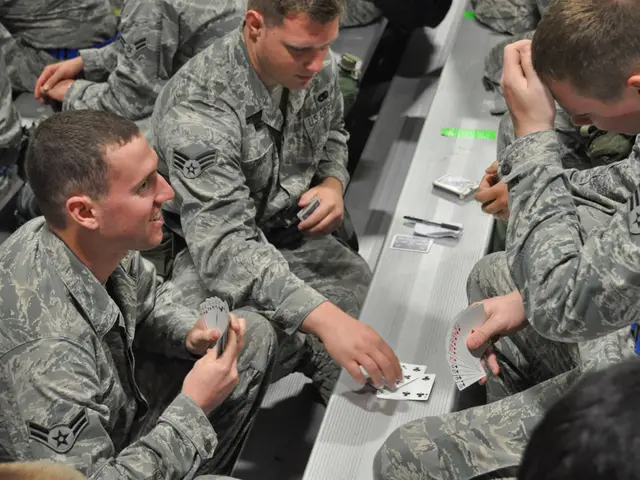Capitol Hill's Gambling Conundrum
Unmasked Ex-Intelligence Officers Issue Alarm: Casino on Capitol Hill Potentially Exposes Vulnerabilities
Problem gambling can expose even the average Joe to risks, but what about those running our nation from Capitol Hill? A proposed casino in Tysons Corner, just a stone's throw from Washington D.C., has raised eyebrows, with over a hundred ex-spies and intelligence officers sounding the alarm.
These seasoned pros fear foreign adversaries could leverage the casino to target problem gamblers among congressional staff, intelligence officers, and military personnel—many of whom hold veritable treasure troves of sensitive information. With the area housing agencies like the CIA, Office of the Director of National Intelligence, Pentagon, and numerous defense contractors, the stakes are sky-high.
The new casino could be a magnet for organized crime
The National Security Leaders for Fairfax group has penned a stern letter to Virginia Governor Glenn Youngkin, as well as members of the Virginia State Assembly. In their view, the casino's attraction to organized crime and potential for foreign adversaries to exploit U.S. personnel is a recipe for disaster.
The group's missive warns against the casino's presence in Northern Virginia, a critical region swarming with the most sensitive security clearances in the country. They argue that in light of the potential security risks, the short-term increase in revenue doesn't justify the long-term socio-economic costs.
Ex-CIA veteran Anne Gruner, who clocked 25 years in the agency, weighs in, expressing concern that federal workers playing at the casino could land themselves in hot water with foreign adversaries.
Gruner stresses that these employees might become prime targets for intelligence collection and even extortion, pointing to her observations during her career of various security issues, misbehaviors, and vulnerabilities within the federal workforce.
A Silver Lining?
Some argue that safeguards are already in place to shield federal workers from such risks. Dan Meyer, a partner at Tully Rinckey, PLLC, a law firm specializing in military and security clearance, maintains that federal workers are bound by a set of security clearance guidelines addressing various aspects of their lives, including sexual behavior, alcohol consumption, criminal conduct, and financial interests.
Meyer contends that these guidelines serve dual purposes—keeping employees in check when they engage in problem gambling and safeguarding national security. He adds that reports of large winnings are flagged through the Financial Crimes Reporting Center, triggering a security officer to reach out to the employee to discuss their behavior.
But is that enough? Meyer acknowledges that not everyone can secure or maintain a clearance, and those who do must maintain impeccable behavior given the sensitive nature of the work they perform. Still, he suggests that the rest of society should decide the rules for commercial activities in which they engage.
The proposed casino in Tysons Corner, a potential magnet for organized crime and a concern for foreign adversaries, has politicized the gambling issue, with national security leaders calling for caution in its establishment due to the sensitive information held by nearby federal workers. The concern about problem gambling among congressional staff, intelligence officers, and military personnel, if left unchecked, could lead to intelligence collection and even extortion, a fear echoed by ex-CIA veteran Anne Gruner.
Despite Dan Meyer's assertion that security clearance guidelines keep federal workers in check regarding their gambling activities, the potential risks associated with a casino so close to Capitol Hill pose a complex issue that goes beyond general news and enters the realm of politics, where the balance between national security and economic benefits must be carefully navigated.




